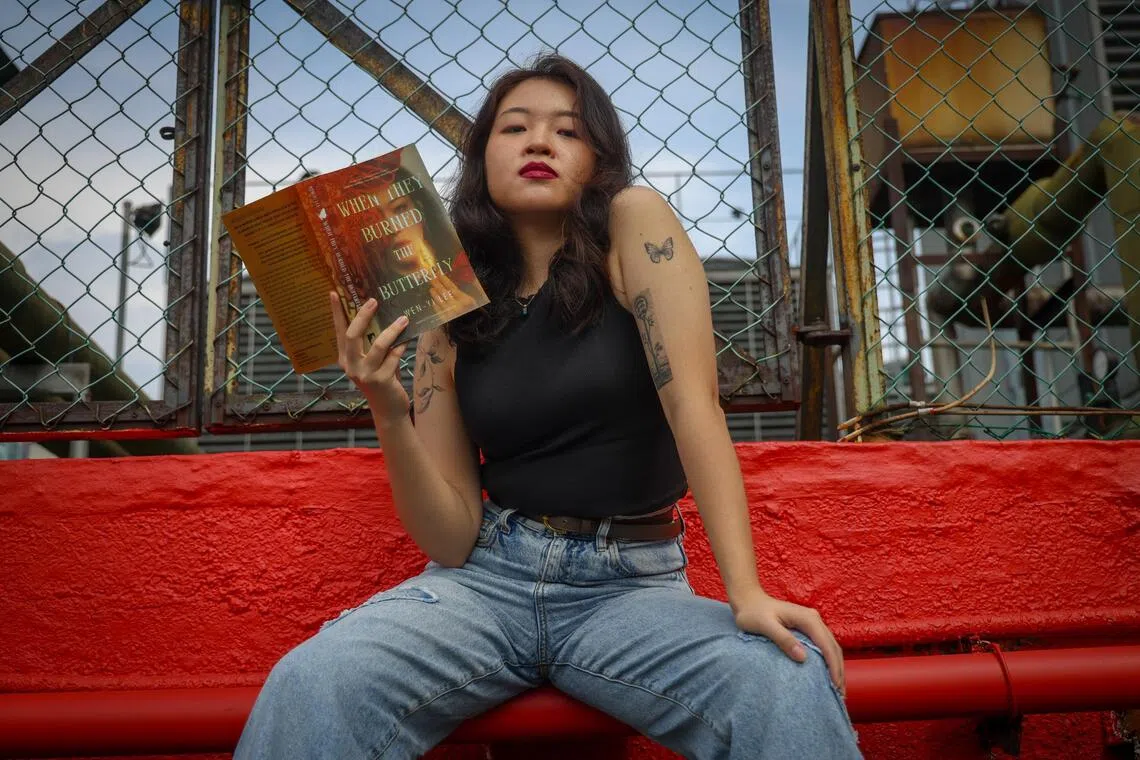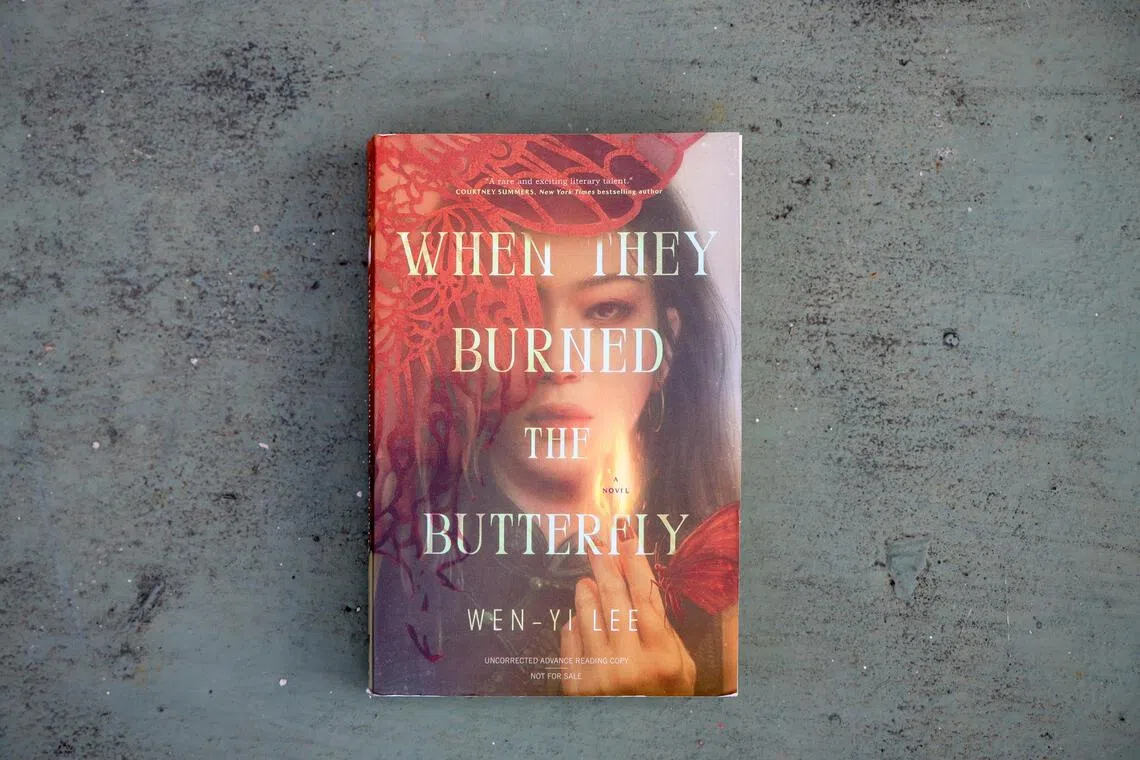All-female, butterfly-tattooed S’pore gang inspired writer Wen-yi Lee’s fantasy novel
Sign up now: Get ST's newsletters delivered to your inbox

Singaporean writer Wen-yi Lee's historical fantasy novel When They Burned The Butterfly (2025) hits Singapore bookstores on Oct 21.
ST PHOTO: JASON QUAH
Follow topic:
SINGAPORE – With a scarlet butterfly tattoo emblazoned on their upper thigh and an acid bomb in hand, gangsters of the Red Butterfly Gang – Singapore’s first all-women secret society – offered protection to sex workers for a fee and revenge-for-hire services for women with cheating spouses.
Writer Wen-yi Lee, 26, was not yet born when the gang prowled Sungei Road and made headlines in the 1950s and 1960s. But a history video a friend sent her on TikTok inspired her to drop a novel idea about samsui women
“Our predominant image of Chinese secret societies is very masculine, brotherhood and male,” says Lee of why she wrote When They Burned The Butterfly, the first book in a duology sold for six figures to New York City-based Tor Books. It hits Singapore bookstores on Oct 21.
“The idea of a purely female gang was very compelling. How do they carve out their own space in this world? What does it look like when this power is adapted by women?” says Lee in an interview with The Straits Times in Chinatown, which features prominently in the book. She, too, sports a butterfly tattoo on her left arm.
In 1972, as Singapore modernises and the edifice of People’s Park Complex rises in Chinatown, the government is cracking down on secret societies like the Crocodile and Three Steel gangs. When the reclusive Adeline Siow’s mother is suddenly killed, the loner schoolgirl is pulled into the world of the Red Butterfly Gang and discovers how she came to inherit the fire powers she was taught to suppress.

Singaporean writer Wen-yi Lee's When They Burned The Butterfly s available for pre-orders and will be available in major bookstores from Oct 21.
ST PHOTO: JASON QUAH
Lee points out that 1972 was also a significant year for the “Christian revival” in Singapore, when students in Methodist schools across Singapore felt moved to take up the faith. Against this historical backdrop, Adeline – an English-educated St Mary schoolgirl – discovers that her Hokkien-speaking mother has been hiding her identity as the elusive patron of a magical gang and its back alley god.
Lee, whose parents raised her Christian and whose grandparents practised Chinese religion, was keen to explore “the generational gap of language, religion, cultural practices and lifestyle” in a Singapore which has changed so dramatically that every generation has a vastly different experience.
To realise the historical landscape of the book, she could not just rely on TikTok. She is all praise for the National Library Board’s digitalisation of Singapore’s newspapers and references historical studies such as historian Kevin Blackburn’s The Comfort Women Of Singapore In History And Memory (2022)
The most “magical” fact she learnt was the existence of a small island in the Singapore River – Pulau Saigon – which has since disappeared from maps. The western arm of the river was drained, coincidentally in 1972, and the land was filled in, making Pulau Saigon an extension of the mainland.
“This whole book has been an exercise in appreciating archives, oral history and what people have written about themselves. A lot of the most valuable texture did not come from academic sources but people who were blogging, sharing on forums about their experiences and even newspapers from that time,” says Lee, who is based in Singapore and works in publishing.
She sees her coming-of-age tale – which features a sapphic love story and a gang of sisters – as a kind of corrective to the male-centred bildungsroman that has dominated Singapore literature, where women are simply vehicles for the male protagonist’s self-growth.
“Something you get from focusing on female perspectives is potentially the less glamorous side of what it takes to build a life – the sacrifices that are made,” she says.
The decision to give her protagonist fire powers is also an invocation of the history of fires that made modern Singapore – the well-known Bukit Ho Swee conflagration of 1961 was instigated by the Red Butterfly Gang in Lee’s book, for example, and 1972 was the year of the Robinsons department store fire.
“There are a lot of parallel anxieties, parallel thoughts about survival and the future, of self-mythologising and making your own identity,” says Lee, who emphasises that it is as much the bildungsroman for her characters as for Singapore.
Lee intuits that there might be a difference between how Western and Singaporean readers understand the book – as the latter might not consider much of the book’s magic system to be strictly fantasy.
“Seeing how it’s been categorised is very interesting. In the United Kingdom and the United States, it is very clearly an urban fantasy. But, to me, it feels quite grounded and not a very big stretch from what people actually believe and is very much present in this day and age.”

Author Wen-yi Lee says the idea of a purely female gang and how they carved out their own space in this world was very compelling.
ST PHOTO: JASON QUAH
The definition of fantasy from a South-east Asian perspective is a conversation she has been having with writers like Malaysian fantasy author Zen Cho. “I think it’s quite meaningful to challenge the idea of what is fantasy – what we consider real and unreal, supernatural and natural.”
But Lee – whose debut novel The Dark We Know (2024) won the endorsement of American thriller author Gillian Flynn
She is in the midst of editing her second book in the duology, tentatively due for publication in 2027.
“I see the first book as one about destruction and the second one about reconstruction and rebuilding. It’s a lot about growth, recreation and there is a kind of necromantic angle to it. It’s grappling with the dead and whether the things that are gone can really come back.”
Nothing is set in stone, but she teases that the next book, which brings the story forward to 1975, might still see the return of the over-represented samsui woman – although with a twist: “It might make it into the next book, but I don’t want to guarantee anything.”
When They Burned The Butterfly ($34.95) is available for pre-order at
www.bookbar.sg/store/p/whentheyburnedthebutterfly
and will be available in major bookstores from Oct 21. Catch Wen-yi Lee at Book Bar at 2pm on Nov 1 for the Singapore book launch.

